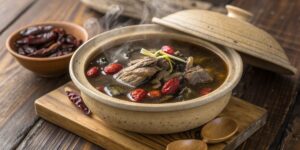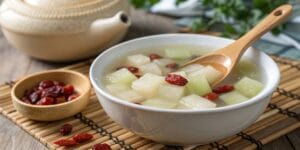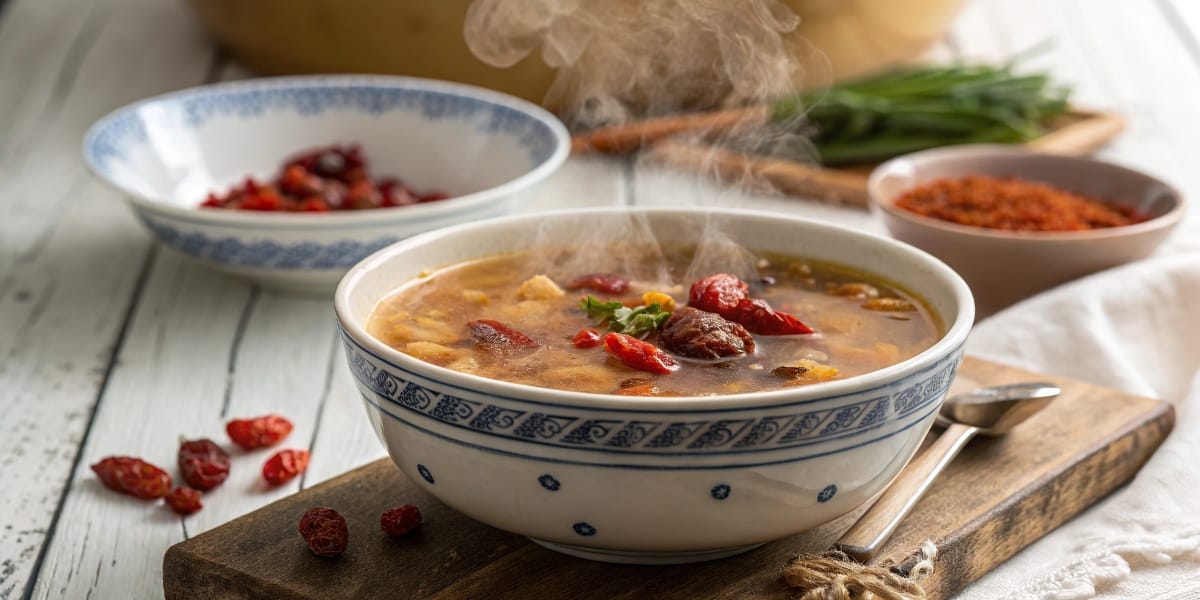Chinese Soup for Sore Throat is not just a delicious remedy but also a powerful healing solution rooted in traditional Chinese medicine (TCM). In TCM, soups are more than just comfort food—they are natural remedies packed with healing ingredients to soothe irritation, reduce inflammation, and promote recovery. From herbal broths to nourishing chicken-based soups, Chinese cuisine offers a variety of time-tested recipes to ease throat discomfort.
This article explores the best Chinese soup for sore throat relief, highlighting their key ingredients, benefits, and easy recipes to try at home. Whether you’re looking for a herbal remedy, a light vegetarian soup, or a hearty congee, you’ll find the perfect option to help you feel better.
Chinese Soup for Sore Throat Understanding the Benefits
Why Is Soup Recommended for a Sore Throat?
Soup is a go-to remedy for sore throats because of its hydrating, warming, and soothing effects. The steam helps to open nasal passages, while warm liquids ease throat irritation and inflammation. Additionally, Chinese soups often include ingredients with medicinal properties that promote faster recovery.
The Healing Properties of Traditional Chinese Soups
Traditional Chinese medicine emphasizes balance in the body. Many Chinese soups are designed to regulate the body’s yin and yang, helping to restore moisture to the throat and clear excess heat (which often manifests as inflammation). These soups often contain:
- Cooling ingredients like winter melon and loquat to reduce heat and irritation.
- Nourishing herbs such as goji berries and ginseng to boost immunity.
- Soothing elements like honey and pear to coat the throat and provide relief.
Key Ingredients in Chinese Soups for Throat Relief
The effectiveness of Chinese soups for sore throat relief lies in their carefully selected ingredients. Some of the most beneficial include:
- Ginger – Anti-inflammatory, boosts circulation, and fights infections.
- Honey – Soothes irritation and has antibacterial properties.
- Goji Berries – Rich in antioxidants and known to strengthen the immune system.
- Red Dates – Nourish the blood and support recovery.
- White Fungus – Coats and hydrates the throat, reducing dryness.
- Loquat – A traditional Chinese remedy for cough and throat irritation.
These ingredients not only enhance the flavor but also help alleviate throat pain, reduce coughing, and promote overall wellness.
Classic Chinese Herbal Soups for Sore Throat
Traditional Chinese herbal soups have been used for centuries to treat various ailments, including sore throats. These soups often incorporate medicinal herbs and natural ingredients that help reduce inflammation, boost immunity, and soothe throat irritation. Below are some of the best classic Chinese soups for sore throat relief.
Ginger and Honey Soup: A Natural Soother
Ginger and honey are well-known for their healing properties, making this soup an excellent remedy for sore throats.
Benefits:
- Ginger contains anti-inflammatory compounds that help reduce throat pain and swelling.
- Honey coats the throat, providing relief from irritation and coughing.
Simple Recipe:
Ingredients:
- 2 cups water
- 1-inch piece of fresh ginger (sliced)
- 1 tablespoon honey
- 1 teaspoon lemon juice (optional)
Instructions:
- Boil the ginger slices in water for 10 minutes.
- Remove from heat and let it cool slightly.
- Stir in honey and lemon juice.
- Sip while warm to soothe the throat.
Loquat and Almond Soup: A Traditional Chinese Remedy
Loquat, commonly used in Chinese medicine, is a powerful remedy for sore throats, coughs, and dry lungs.
Benefits:
- Loquat leaves and fruit help reduce throat inflammation and relieve coughing.
- Almonds (specifically Chinese sweet almonds) nourish the lungs and provide moisture.
Simple Recipe:
Ingredients:
- 1 cup fresh loquat fruit (peeled and deseeded)
- 10 Chinese sweet almonds (also known as apricot kernels)
- 3 cups water
- 1 tablespoon rock sugar
Instructions:
- Boil loquat fruit and almonds in water for 15 minutes.
- Add rock sugar and stir until dissolved.
- Strain and drink warm for throat relief.
Goji Berry and Red Date Soup: Boosting Immunity and Throat Health
Goji berries and red dates are widely used in Chinese soups for their immune-boosting and anti-inflammatory properties.
Benefits:
- Goji berries help strengthen the immune system and protect the throat.
- Red dates provide nourishment and promote healing.
Simple Recipe:
Ingredients:
- 1 tablespoon dried goji berries
- 3 dried red dates (pitted)
- 2 cups water
- 1 teaspoon honey
Instructions:
- Boil red dates in water for 10 minutes.
- Add goji berries and continue simmering for 5 more minutes.
- Let cool slightly, then stir in honey before drinking.
Chicken-Based Chinese Soups for Soothing the Throat

Chicken-based soups are well-known for their nourishing and immune-boosting properties. In Chinese medicine, chicken soup is believed to strengthen the body, provide warmth, and promote faster recovery. Below are some of the best Chinese chicken soups to soothe a sore throat.
Chinese Herbal Chicken Soup: A Nourishing Remedy
This traditional soup combines the benefits of chicken with medicinal herbs to support the immune system and relieve throat discomfort.
Benefits:
- Chicken broth is rich in collagen and amino acids, which help repair tissues and reduce inflammation.
- Goji berries and red dates provide additional nutrients to aid recovery.
- Ginger and garlic act as natural antibiotics to fight infections.
Simple Recipe:
Ingredients:
- 1 whole chicken (or 2 chicken thighs)
- 4 cups water
- 5 dried red dates (pitted)
- 1 tablespoon goji berries
- 2 slices fresh ginger
- 2 cloves garlic (crushed)
- Salt to taste
Instructions:
- In a pot, bring water to a boil and add the chicken. Let it simmer for 10 minutes, then discard the water (to remove impurities).
- Add fresh water, ginger, garlic, red dates, and goji berries.
- Simmer on low heat for 1–2 hours until the chicken is tender.
- Add salt to taste and serve warm.
Ginseng and Chicken Soup: Energy and Recovery
Ginseng is a powerful herb known to boost energy, strengthen the immune system, and speed up recovery from colds and sore throats.
Benefits:
- Ginseng enhances stamina and strengthens the body’s defense system.
- Chicken provides essential nutrients for healing.
- Jujube (Chinese red date) helps moisten the throat and replenish energy.
Simple Recipe:
Ingredients:
- 1 small whole chicken (or chicken thighs)
- 5 cups water
- 1 small ginseng root (or 1 teaspoon ginseng powder)
- 3 dried jujubes (red dates)
- 1 tablespoon goji berries
- Salt to taste
Instructions:
- Rinse the chicken and place it in a pot with water. Bring to a boil.
- Add ginseng, jujubes, and goji berries.
- Simmer on low heat for 1.5–2 hours.
- Season with salt before serving.
Silkie Chicken Soup: Traditional Chinese Medicine’s Powerhouse
Silkie chicken, known for its black skin, is highly valued in Chinese medicine for its superior nutrition and healing benefits.
Benefits:
- Silkie chicken is rich in antioxidants, helping to fight illness.
- Angelica root and astragalus enhance the immune system and boost recovery.
- Ginger and red dates provide warmth and nourish the throat.
Simple Recipe:
Ingredients:
- 1 silkie chicken (cut into pieces)
- 4 cups water
- 2 slices ginger
- 3 dried red dates
- 1 teaspoon astragalus root
- 1 teaspoon angelica root
- Salt to taste
Instructions:
- Blanch the silkie chicken in boiling water for 5 minutes, then drain.
- In a clean pot, add water, ginger, red dates, astragalus, and angelica root.
- Simmer for 2 hours until the chicken is tender.
- Add salt and serve warm.
Vegetarian and Vegan Chinese Soups for Sore Throat

For those who prefer plant-based remedies, Chinese vegetarian soups offer excellent throat-soothing benefits. These soups are light, hydrating, and filled with natural anti-inflammatory ingredients to help ease throat discomfort.
Bok Choy and Tofu Soup: A Gentle Healing Choice
This light and nutritious soup is packed with vitamins and minerals that promote healing.
Benefits:
- Bok choy is rich in vitamin C, which supports the immune system.
- Tofu provides protein and soft texture, making it easy on the throat.
- Ginger soothes inflammation and enhances circulation.
Simple Recipe:
Ingredients:
- 3 cups water or vegetable broth
- 1 cup bok choy (chopped)
- ½ cup soft tofu (cubed)
- 1-inch ginger (sliced)
- 1 teaspoon sesame oil
- Salt and white pepper to taste
Instructions:
- Bring the water to a boil and add ginger.
- Add bok choy and cook for 3–4 minutes.
- Gently stir in the tofu and let it heat for another 2 minutes.
- Season with salt, white pepper, and sesame oil before serving.
Mushroom and Seaweed Soup: A Mineral-Rich Soother
Mushrooms and seaweed are packed with antioxidants and anti-inflammatory properties, making this soup an excellent remedy for sore throats.
Benefits:
- Shiitake mushrooms have immune-boosting and antiviral properties.
- Seaweed is rich in iodine and minerals that promote overall healing.
- Garlic has natural antibacterial effects to fight throat infections.
Simple Recipe:
Ingredients:
- 3 cups vegetable broth
- ½ cup shiitake mushrooms (sliced)
- 1 tablespoon dried seaweed (wakame)
- 1 garlic clove (minced)
- 1 teaspoon soy sauce
- ½ teaspoon sesame oil
Instructions:
- Heat the broth in a pot and add garlic and mushrooms. Simmer for 5 minutes.
- Add seaweed and soy sauce, and cook for another 3 minutes.
- Stir in sesame oil before serving.
Winter Melon Soup: Cooling and Moisturizing the Throat
Winter melon is often used in Chinese medicine to clear heat and moisten the throat, making it an ideal ingredient for sore throat relief.
Benefits:
- Winter melon helps cool down inflammation and keeps the throat hydrated.
- Goji berries provide antioxidants for immune support.
- Ginger warms the body and helps reduce irritation.
Simple Recipe:
Ingredients:
- 3 cups water or vegetable broth
- 1 cup winter melon (cubed)
- 1 tablespoon goji berries
- 1-inch ginger (sliced)
- Salt to taste
Instructions:
- Bring water to a boil and add ginger.
- Add winter melon cubes and cook for 10 minutes.
- Stir in goji berries and let simmer for another 5 minutes.
- Add salt to taste and serve warm.
Congee – The Ultimate Soft and Comforting Chinese Soup
Congee, also known as rice porridge, is a staple in Chinese cuisine and a go-to remedy for sore throats. Its soft texture makes it easy to swallow, while the warm broth provides hydration and relief. Congee can be made with various ingredients to enhance its healing properties.
What Is Congee and Why Is It Beneficial for a Sore Throat?
Congee is a slow-cooked rice porridge that becomes soft and easy to digest. It is ideal for those with sore throats because:
- It requires minimal chewing, making it easy on the throat.
- It keeps the body hydrated, preventing further irritation.
- It can be enriched with medicinal ingredients, such as ginger, honey, and pears.
Ginger and Rice Congee: A Simple, Healing Recipe
Ginger is known for its warming and anti-inflammatory properties, making this congee an excellent choice for soothing a sore throat.
Benefits:
- Ginger helps reduce throat inflammation and boosts circulation.
- Rice porridge provides gentle nourishment without irritating the throat.
Simple Recipe:
Ingredients:
- ½ cup white rice
- 5 cups water
- 1-inch ginger (sliced)
- 1 teaspoon sesame oil
- Salt to taste
Instructions:
- Rinse the rice and place it in a pot with water.
- Add sliced ginger and bring to a boil.
- Lower the heat and simmer for 45 minutes, stirring occasionally.
- Add sesame oil and salt before serving warm.
Pear and White Fungus Congee: A Throat-Coating Remedy
Pear and white fungus are commonly used in Chinese medicine to hydrate and soothe the throat.
Benefits:
- Pear is rich in moisture and soothes dry throat irritation.
- White fungus coats the throat and relieves discomfort.
Simple Recipe:
Ingredients:
- ½ cup white rice
- 5 cups water
- 1 small pear (peeled and chopped)
- 1 tablespoon dried white fungus (soaked and chopped)
- 1 teaspoon honey (optional)
Instructions:
- Rinse the rice and place it in a pot with water.
- Add white fungus and simmer for 40 minutes.
- Stir in the pear and cook for another 5 minutes.
- Add honey before serving warm.
Traditional Chinese Medicine (TCM) Approach to Sore Throat Relief
Traditional Chinese Medicine (TCM) views sore throats as an imbalance in the body’s yin and yang, often caused by excessive heat, dryness, or weak immunity. Chinese soups and herbal remedies are carefully designed to restore balance, reduce inflammation, and promote overall wellness.
How TCM Views Sore Throats: Yin and Yang Balance
In TCM, a sore throat can result from:
- Heat excess (yang dominance) – Often caused by spicy, fried, or overly stimulating foods. Symptoms include a dry, red, and swollen throat.
- Yin deficiency – When the body lacks fluids, leading to dryness and irritation. Symptoms include a chronic dry cough and hoarse voice.
- Qi deficiency – A weakened immune system can make the body more susceptible to infections.
TCM Strategies to Treat a Sore Throat
TCM uses herbs, food therapy, and acupuncture to restore balance. Some effective strategies include:
- Cooling herbs (for heat excess): Chrysanthemum, loquat, and mint.
- Moisturizing foods (for yin deficiency): White fungus, pears, and honey.
- Strengthening ingredients (for qi deficiency): Ginseng, astragalus, and red dates.
Herbal Additions to Chinese Soups for Maximum Relief
Adding specific herbs to soups enhances their healing effects. Some powerful TCM herbs for sore throats include:
| TCM Herb | Benefits | How to Use in Soup |
|---|---|---|
| Licorice Root | Soothes the throat, reduces coughing | Add a few slices to broth |
| Loquat Leaves | Clears heat and reduces inflammation | Boil with chicken or vegetables |
| Chrysanthemum | Cools the body and relieves irritation | Brew into a tea or add to soup |
| Astragalus | Boosts immunity and prevents illness | Simmer in chicken soup |
| White Fungus | Hydrates and coats the throat | Add to congee or soup |
TCM Dietary Recommendations for Fast Healing
In addition to soups, TCM recommends adjusting your diet to speed up recovery:
✅ Eat more: Warm, easy-to-digest foods like congee, steamed vegetables, and herbal teas.
❌ Avoid: Spicy, greasy, and fried foods that can worsen throat irritation.
Chinese Drinks That Help Soothe a Sore Throat

While soups are excellent for sore throat relief, certain Chinese herbal drinks can also help ease irritation, reduce inflammation, and promote healing. These beverages are often consumed warm to keep the throat hydrated and comfortable.
Chrysanthemum Tea: A Cooling and Anti-Inflammatory Option
Chrysanthemum tea is widely used in Traditional Chinese Medicine (TCM) to cool the body and reduce throat irritation.
Benefits:
- Reduces inflammation and soothes a dry, sore throat.
- Helps clear heat from the body, preventing further irritation.
- Supports respiratory health and relieves mild coughs.
Simple Recipe:
Ingredients:
- 1 tablespoon dried chrysanthemum flowers
- 2 cups hot water
- 1 teaspoon honey (optional)
Instructions:
- Steep the dried chrysanthemum flowers in hot water for 5–10 minutes.
- Strain and add honey if desired.
- Drink warm to soothe the throat.
Licorice Root Tea: A TCM Favorite for Throat Comfort
Licorice root is known for its throat-coating and cough-relieving properties, making it an excellent herbal remedy.
Benefits:
- Acts as a natural expectorant, reducing mucus buildup.
- Helps relieve hoarseness and voice strain.
- Has anti-inflammatory and antimicrobial properties to combat infections.
Simple Recipe:
Ingredients:
- 1 tablespoon dried licorice root
- 2 cups boiling water
Instructions:
- Add licorice root to boiling water.
- Simmer for 10 minutes, then strain.
- Drink warm for maximum relief.
Salted Lemon and Honey Drink: A Time-Tested Remedy
Salted lemon is a traditional Chinese remedy that helps clear mucus and soothe sore throats.
Benefits:
- Lemon provides vitamin C and acts as a natural antiseptic.
- Salt helps break down mucus and ease throat discomfort.
- Honey coats the throat, reducing irritation.
Simple Recipe:
Ingredients:
- 1 preserved salted lemon (or fresh lemon with a pinch of salt)
- 1 cup warm water
- 1 teaspoon honey
Instructions:
- Mash the salted lemon into a cup.
- Add warm water and stir well.
- Mix in honey and drink slowly.
Tips for Making the Best Chinese Soup for a Sore Throat
To maximize the healing benefits of Chinese soups, it’s essential to use the right ingredients, cooking methods, and preparation techniques. Below are expert tips to ensure your soups provide maximum relief for a sore throat.
How to Choose the Right Ingredients for Maximum Relief
Selecting the best ingredients is crucial for making an effective healing soup. Here are some essential ingredients to include:
| Ingredient | Benefits for Sore Throat | How to Use in Soup |
|---|---|---|
| Ginger | Reduces inflammation and fights infections | Simmer in broth or congee |
| Goji Berries | Boosts immunity and hydrates the throat | Add to herbal or chicken soup |
| Red Dates | Nourishes the blood and relieves fatigue | Simmer with chicken or herbs |
| White Fungus | Moisturizes and coats the throat | Add to congee or light soups |
| Loquat | Soothes dry coughs and sore throat | Boil in soups or herbal drinks |
| Honey | Coats the throat and reduces irritation | Add to warm soups or tea |
Cooking Techniques to Retain Nutrients and Flavor
Using the right cooking methods helps preserve the medicinal benefits of ingredients. Follow these techniques for the best results:
✔ Simmer on Low Heat – Slow cooking helps extract nutrients without destroying them.
✔ Use Fresh Ingredients – Dried or stale ingredients may lose their healing properties.
✔ Avoid Overboiling – Overcooking herbs and delicate ingredients can reduce effectiveness.
✔ Add Herbs at the Right Time – Some ingredients, like goji berries and honey, should be added towards the end of cooking to retain their nutrients.
What to Avoid in Soups When You Have a Sore Throat
Certain foods and ingredients can worsen throat irritation and delay healing. Avoid the following:
❌ Spicy foods – Can aggravate throat inflammation.
❌ Deep-fried ingredients – Can increase mucus production and worsen symptoms.
❌ Dairy-based broths – Can thicken mucus and cause discomfort.
❌ Cold soups – Warm or room-temperature soups are better for soothing the throat.
Frequently Asked Questions (FAQs)
To provide further clarity on Chinese soups and their effectiveness for sore throats, here are answers to commonly asked questions.
1. Which Chinese soup is good for a sore throat?
Several Chinese soups help soothe a sore throat, including:
- Ginger and Honey Soup – Reduces inflammation and provides warmth.
- Loquat and Almond Soup – Moisturizes the throat and relieves dryness.
- Chinese Herbal Chicken Soup – Strengthens the immune system and promotes recovery.
- Winter Melon Soup – Helps cool down throat irritation.
- Goji Berry and Red Date Soup – Provides nourishment and antioxidants.
2. What is the Chinese trick for a sore throat?
Traditional Chinese Medicine (TCM) recommends balancing the body’s yin and yang to heal a sore throat. Common remedies include:
- Drinking Chrysanthemum Tea to clear heat.
- Eating white fungus congee to moisturize the throat.
- Consuming licorice root tea to reduce inflammation.
- Using honey and warm water to coat and soothe the throat.
3. What kind of soup is best for a sore throat?
The best soups for a sore throat are:
- Clear broths (like herbal chicken soup) for nourishment.
- Vegetable-based soups (such as bok choy and tofu soup) for hydration.
- Congee (rice porridge) for easy digestion and throat coating.
- Herbal soups with ginger, goji berries, and red dates to promote healing.
4. Which Chinese drink is good for a sore throat?
Apart from soups, several Chinese herbal drinks help soothe sore throats, including:
- Chrysanthemum Tea – Cools the body and reduces inflammation.
- Licorice Root Tea – Soothes the throat and relieves coughs.
- Salted Lemon and Honey Drink – Clears mucus and prevents irritation.
- Loquat Leaf Tea – Used in TCM for respiratory relief.
Conclusion
Chinese soups are powerful natural remedies for sore throats, offering warmth, hydration, and medicinal benefits. Whether you choose a herbal broth, a nourishing chicken soup, or a light congee, these time-tested recipes can help relieve discomfort and promote faster healing. Pairing these soups with Chinese herbal drinks and TCM dietary practices can further enhance their effectiveness.
Looking for more healing recipes? Check out our detailed guide on the best soups for sore throat and cough.

